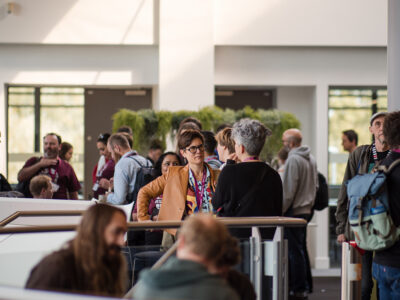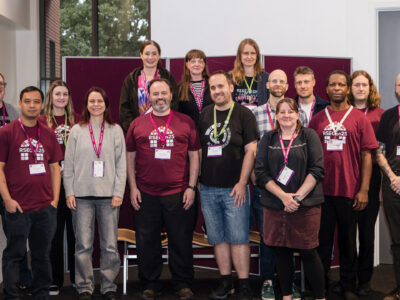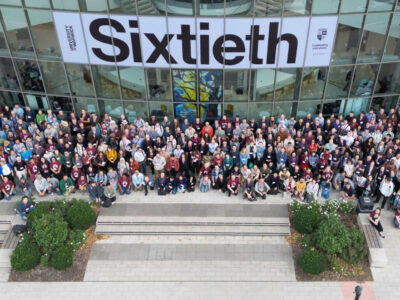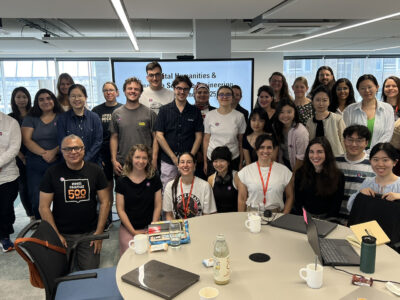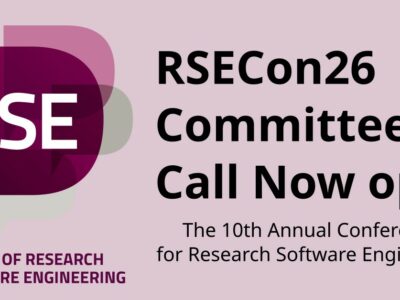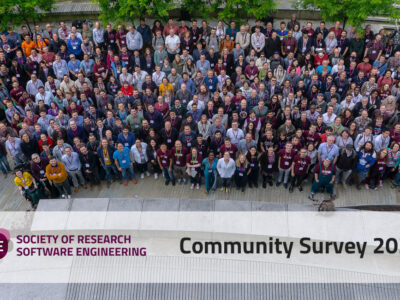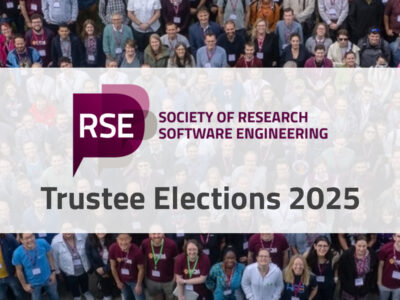Trustee Elections 2024 – The Nominees
The nominations for the 2024 RSE Society Trustee elections have now closed. We have two candidates applying to join the board and, as there are five vacancies, there is no need for a competitive election this year. The two candidates will be presented at the AGM, which will take place at RSECon24 in Newcastle on 4th September, where Society members will vote to approve their election.
So, let’s meet the candidates! Below are the responses to the questions on the nomination form.
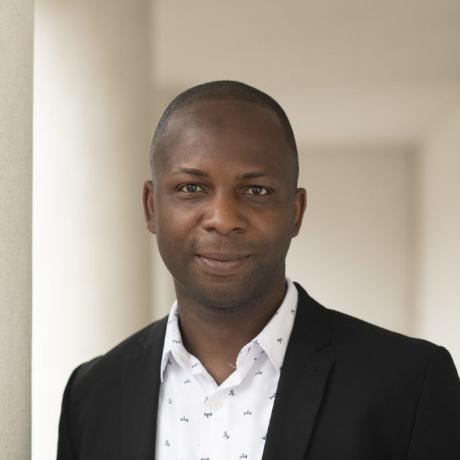

Godwin Yeboah
Senior Research Software Engineer (University of Warwick)
1) Why do you want to be a trustee of the Society?
I am eager to join the Board of Trustees to continue my active contribution towards shaping the future of the Society and the RSE movement. Ever since I joined the Society, I have played a key role in the formation of the RSE Midlands group. My contributions include setting up its X (previously known as Twitter) and Mastodon social media accounts to highlight RSE-centric activities, logo design, co-managing its website hosted on GitHub, and co-organization of the group’s annual conferences, especially those in 2022 and 2024. I have also been privileged to act as a reviewer for the Society’s yearly conference. My enthusiasm for advancing RSE is congruent with the Society’s charitable aims, and I am eager to contribute to the management of the Society’s programs for the welfare of its members and the public benefit.
2) Which of the current activities that the Society engages in are you best suited to help with?
Given my existing skills and experience, I believe I can contribute to these areas: managing memberships, organizing the annual RSE conference along with other events, overseeing the Society’s financial matters, undertaking web and infrastructure projects, handling communications & publicity tasks, and promoting EDIA initiatives.
3) What can you bring to the role of trustee that would be useful in running the Society?
My experience as the Membership Secretary and Treasurer of the UK Royal Geographical Society’s Digital Geography Research Group has provided me with a set of skills that I envisage would be useful to the Society. I am also eager to learn and acquire new skills from others. I have had the privilege of co-organizing several conferences (and sessions) in the UK and Europe, an experience that could be beneficial to the Society. My web development skills could also be a useful contribution to the Society’s work. I am confident that my background will enable me to contribute effectively to the Society’s various activities and working groups and ensure that projects align with the needs of members. I am excited to bring my enthusiasm, commitment, skills, experience, positive attitude, and perspective to the role.
4) What do you hope to get out of being a trustee for the Society?
Serving as a trustee offers a distinctive opportunity for both personal and professional advancement, nurturing connections with peers, establishing new friendships, and enhancing my profile within the RSE community. I am enthusiastic about the potential to collaborate with a diverse array of trustees and members, and to bring about meaningful change in research and society in a world that is constantly evolving.
Philip Grylls
Senior Research Software Engineer (University of Warwick)
1) Why do you want to be a trustee of the Society?
I started in RSE attending the RSECon19 with an interview for my first RSE position the following day. Since then, I have been an active member of the society, running satellite events at conferences and organising regional meetings. I want to continue to aid the Society and its members by contributing my time to assist with the running as a trustee. I have three policy foci; training researchers to write better software, the necessity of funding research software development, the importance of FOSS and FAIR software. 1. Training: I spend around 50% of my time writing and delivering training. Combining a background in education, PGCE, with my research and RSE experience I promote pedagogic approaches. This ensures researchers go beyond writing code, to understanding compute as research equipment. If elected I will advocate for training that moves beyond comprehension and application, to understanding and creation. 2. Funding: Current funding models for Research Software and RSEs, whilst better today than in the past, still have a long way to go. Funding must properly acknowledge the lifecycle of research code and the vast contributions made to community packages. If elected, I will campaign for opening funding streams for people to work on and be acknowledged for community package development. This will include working with traditional funders and industry. 3. FOSS & FAIR software: In all projects I work on I encourage researchers to implement FAIR principles and where possible use FOSS licences. These two principles, when implemented properly raise the trust in research software and make it a 1st class research output suitable for the REF. If elected, I will continue to advocate for the importance of FOSS and FAIR software locally and nationally. As a trustee I will use these areas to make sure the society is engaged with: 1. Those learning to write research software; 2. Those who are in a position to fund research software; 3. Those who work on research software.
2) Which of the current activities that the Society engages in are you best suited to help with?
As a trustee I would seek to join the Governance group. From this position join or set up working and/or special interest groups to promote the above points. Using the society structures I would invest significant time to developing the goals and activities of these groups to ensure they have measurable short to mid-term impacts as well as the ability to be self-sustaining in the long term.
In my first RSE role at Southampton I worked with RSE trustees and policy makers where I learnt about driving policy and effective governance. At Warwick, where I work currently, I started internal initiatives to create a stronger RSE working community and promoted RSE at Warwick nationally.
With other trustees I will identify areas the society should have a policy position on. Then develop a working group to engage with organisations proactively effecting national research software policy. To aid with this I will draw on my contacts within the SSI who have a track record of effective policy work.
3) What can you bring to the role of trustee that would be useful in running the Society?
I think I would make a good trustee as I am a strong communicator and passionate about effecting change in the research software landscape. Having worked with trustees previously I am aware of the time commitment of being a trustee. In my current role I have a significant amount of elective time that I can contribute to the society. I want to go into this role acknowledging the effort required and with the time and motivation to work on behalf of the society members. I have the support of my colleagues at Warwick meaning that I will be able to make sure that the role of being a trustee and advocating on your behalf is a priority of mine during my term.
4) What do you hope to get out of being a trustee for the Society?
Personally, I have been working as an RSE for 5 years and want to continue to develop in this field. I have learnt from some fantastic people in the places I have worked and want to continue to grow by working within the society to meet more people with diverse viewpoints from across the country. I hope this will mean that any activities I will undertake as a trustee will reflect what is best for RSE nationally. As a trustee of the society, I want to work with and on behalf of other members of the community who want to see changes in the three points. I will work to drive working groups in training to deliver the professionalisation of training nationally. I want to join other members of the community to lobby for funding models that work for software and RSE activity as opposed to fitting software and RSE into existing funding structures. Finally, I want to create closer ties between the society and UKRN to promote the essential nature of FOSS & FAIR software in reproducible research.
The Legal Stuff
Each of the above candidates has confirmed that they are Society members, that they are eligible to serve as Trustees, that they have no existing conflicts of interest, and that they have the support of their line managers to take on these roles. Each nomination has also been seconded by at least one Society member.
This information will also be made available in our annual report and in an announcement to Society members ahead of the AGM in September. Every Society member present (in person and online) at the AGM will be eligible to vote on whether to accept their nominations and officially invite them to join the board of trustees.
This does leave us with three vacancies, so if you are considering joining us, there may be an opportunity to nominate yourself on the day of the AGM and to join us, pending an approval vote from our members.
Join Us
If you haven’t already, be sure to join our mailing list and follow us on social media for future announcements. Remember that there are also a number of Working Groups and Special Interest Groups that you can join if you want to get involved in the Society without becoming a trustee, and there will be new opportunities to join the board and shape the future of the RSE movement next year.
Finally, I want to say thank you to all of my fellow trustees, but a special thank you to those who are stepping down this year and to our soon-to-be colleagues for nominating themselves.
The Elections Working Group for 2024 is: Mike Simpson (chair), David Beavan, Evelina Gabasova, and Twin Karmakharm.


